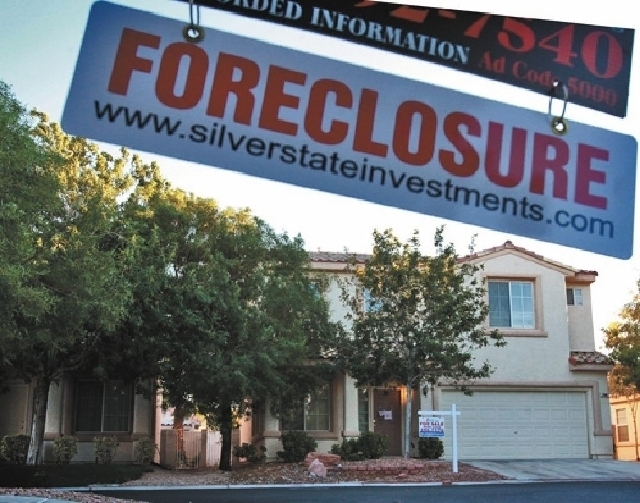Study: Nevada repeats as No. 2 for mortgage fraud
Nevada’s high foreclosure rate has made it a target for mortgage fraud investigations.
Nevada ranked second on the LexisNexis Mortgage Fraud Index for 2012, the same rank it had in 2011, and up from No. 3 in 2010 and No. 6 in 2008. The index rates states by the number of fraud investigations loan servicers begin.
Jon Gedde, president-elect of the Nevada Association of Mortgage Professionals, didn’t challenge Nevada’s high ranking. But he said the stats reflect fraud inquiries rather than actual wrongdoing. If a borrower stops making payments, the loan servicer might look for inconsistencies, such as information left off of an application, or misstated income. If anything looks suspicious, there’ll be an investigation, he said.
Scams exploiting homeowners who’ve fallen behind on payments are also rampant, LexisNexis said.
If it’s defaults that trigger fraud reviews, well, Nevada has a lot to work with, said Russell Smith, the chief deputy who runs the state attorney general’s mortgage fraud unit. Nevada has ranked in the top five for foreclosures for more than half a decade. LexisNexis ranked Nevada fourth in the nation in 2012, with 4.13 percent of its properties in default, though that was down from No. 2 in 2011, when 7 percent of loans were late.
Plus, a Wednesday report from California real estate website RealtyTrac pegged the state’s default rate at one in every 359 homes, more than two times the national average.
“As long as we’re No. 1 in foreclosures and the economy is slower to bounce back, were going to be No. 1 for fraud,” Smith said.
And that’s not good for the economy, observers agreed. If people aren’t honest when they get a mortgage, they’re likelier to have trouble making payments, Gedde said. That means sustained high default rates, and bigger potential for more empty homes and the falling values that follow — something the Las Vegas Valley doesn’t need more of, Smith said.
The LexisNexis report wasn’t all bad. Nevada failed to make its top 10 for origination fraud, which happens if a mortgage professional misrepresents a verification of employment, credit report, financial statement or other document on a new application. That’s a testament to how hard state and industry officials have worked to improve industry standards, Gedde said.
Nevada had more than 30,000 licensed loan originators in 2006, when the housing bubble was poised to pop, Gedde said. Today, it has fewer than 1,800. That’s because originators pre-recession merely had to give fingerprints and cough up a $175 application fee. Now, they need 20 hours of industry education and 10 hours of state training before they can get a license.
“The industry has done a very good job combating mortgage fraud and setting the table to prevent the sort of crisis we saw after the bubble,” Gedde said.
It’s been tougher to stamp out distressed-homeowner fraud, which LexisNexis said has supplanted origination fraud as the industry’s biggest problem. Distressed-homeowner fraud involves scammers who call or mail homeowners in default, take cash upfront to help modify a mortgage and skip out with the money before they ever contact the bank on the owner’s behalf.
That type of misrepresentation is especially devastating to the housing economy because “a family that might have been able to work something out with the bank has no chance now,” Smith said. “They’ve passed much farther down the road into foreclosure.”
The attorney general’s office received 300 distressed-homeowner fraud complaints in 2011, and 496 complaints in 2012. Through Friday, the agency had received 115 complaints for 2013.
Big, local mortgage-fraud cases included the 2012 conviction in federal court of a husband and wife who used straw buyers to purchase 227 homes with $107 million in bank loans. Almost all of the homes went into default, costing banks $52 million.
In another case filed Thursday in California, state and federal officials arrested Las Vegan Ray Jan Kornfeld, who offered to eliminate homeowners’ mortgages and replace them with a debt for 25 percent of the loan to his company, KATN Trust. Kornfeld collected thousands of dollars from each victim and told borrowers to stop paying or trying to work out an agreement with their bank. Many of the victims lost their homes to foreclosure as a result, officials allege.
To fight mortgage fraud, the attorney general’s office launched its Home Again Nevada Homeowner Relief initiative in January. The free program lets homeowners check with the agency at 1-855-457-4638 for a list of state or federal resources for loan modification and other help with troubled mortgages.
“If everyone found help through Home Again, there’d be no mortgage fraud,” Smith said.
If you’d like to report potential mortgage fraud, contact the attorney general’s office at ag.nv.gov/complaints.
Contact reporter Jennifer Robison at jrobison@reviewjournal.com. Follow @J_Robison1 on Twitter.




























